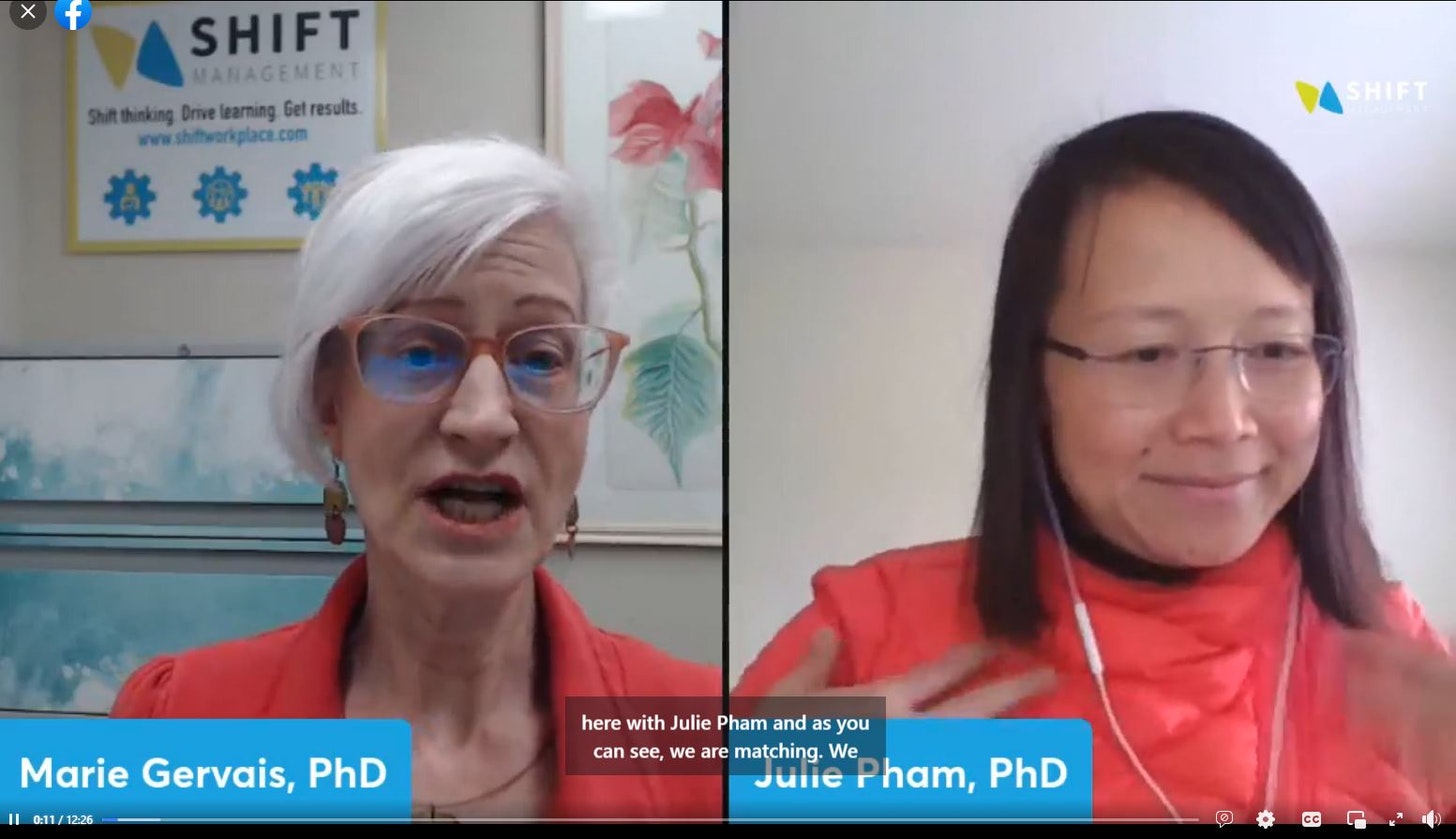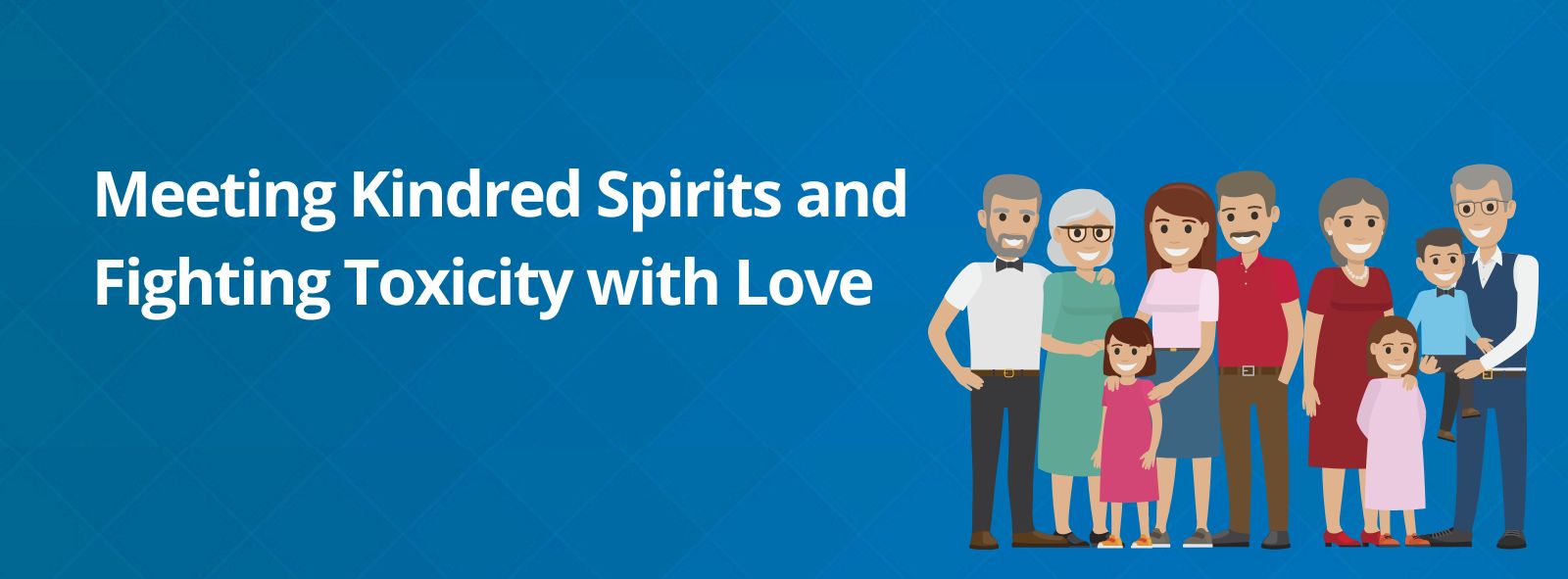A keynote speech delivered by Dr. Julie Pham at “The Spirit of Work” book launch
You never know when, where, or how you will meet a kindred spirit. That is how I feel about Dr. Marie Gervais. We met three months ago, when she interviewed me for her podcast, after I emailed her, asking if I could be a guest. What she doesn’t know is that I had paid $75 to Fiverr to provide me with a list of 100 podcasts that I should reach out to. I listened to Marie’s Culture and Learning in the Workplace podcast and was moved by how personable and authentic she was. Marie invited me onto her podcast.
Right after Marie interviewed me, she said she wanted to invite me to be on another short live interview where we could both talk about her upcoming books, her The Spirit of Work, and my book, 7 Forms of Respect, and where they overlap in themes. This is an example of how Marie is all about the win-win. Many authors who are launching their books are solely focused on their own promotion. I was moved by her generosity. If you go into Our LinkedIn pages, you would think we’ve known each other for years because we are constantly commenting and liking each other’s work and posts.
I found in Marie a new friend with whom I have lots in common. We are passionate believers in the complexity of culture and the influence of culture because we ourselves are people who belong to multiple cultures. Marie is a Russian-German Canadian and I’m a Vietnamese American. We both have many experiences with those from diverse backgrounds. We also pay close attention to language and how to describe the world around us.
And we also really like bright pink. We both showed up in the same color, totally unplanned, for our conversations about our respective books.

The beautiful thing about languages is that we can be multilingual. No one language is better or more true than others. Each one has its own quality. And languages can complement one another.
I was truly honored when Marie asked me to keynote her book launch event on May 7. One of the things I didn’t like about my years in academia was the subtle tearing down of other scholars’ work to increase the credibility of our own work. Marie’s work celebrates not only other scholars, she also honors ancient spiritual traditions, which is a fresh look in organizational development.
I got many aha moments from The Spirit of Work. I’d like to share three ways that this book has given me a new language to see the world.
The different kinds of conflict
Conflict can be focused differently, including 1) logistical and administrative focused, 2) relationship focused, 3 conflict resolution focused. She listed five ways for managers to prevent unnecessary conflict, including: 1) emphasis on organizational goals and effectiveness, 2) clear well structured tasks, 3) communication, 4) interest in the experience of others, and 5) avoiding win/lose situations.
The different thinking types
These include: creative thinking, critical thinking, reflective thinking, perceptual/concrete thinking, conceptual/abstract thinking and about how to engage multiple ways of thinking in a workplace context. It would be very useful for people to be aware of the different types. I am now much more conscious of how I also think differently at different times.
Virtues in decision-making and the virtue of love
Marie describes “virtues as a concept that exists in every culture, religion, and value system in the world. Virtues may be understood differently in practice or applied in multiple ways; however the core concepts can be found wherever you find human beings. A virtue is something that expands your human potential and that of others.”
Marie presents a virtue decision making progression, where love leads to truth, which leads to justice, which leads to unity, which leads to peace, which leads to abundance. It’s a progression. You can’t have abundance without peace and you can’t have peace without unity and you can’t have unity without justice, and you can’t have justice without truth, and you can’t have truth without love.
It made me think about how I was at this one company where there was a lot of love, but there was no truth. And the company eventually limped along. Love isn’t enough. Marie shares the story which I will read here:
I explained the language of virtues to a colleague of mine who was working as a teacher in an elementary school. The teacher told me that her principal was a mean-spirited woman who consistently sought to publicly humiliate staff members. After hearing about using the language of virtues, she decided to experiment with a “virtuous coup” together with a colleague. Together they plotted to regularly build up, encourage, compliment and help other staff. Some of their actions involved notes on colleagues’ desks naming a virtue they saw in that colleague, taking on other teachers’ recess or noon supervisions “just because,” and going out of their way to compliment colleagues in the hallways when they were with their classes, telling students they were fortunate to have such a dedicated teacher and using a virtue in the compliment. After a couple of weeks of this, the two teachers privately solicited other colleagues to participate in their “virtuous coup.” By the time the next staff meeting was called, the relationships between staff members had changed from isolation and suspicion to open admiration and friendliness. The principal tried to make an example of a teacher she sought to humiliate at the beginning of the meeting, and several teachers chimed into say how they had only seen good things from that colleague, citing several examples. Taken aback, the principal tried another divisive tactic, and was met again with a barrage of positive counterattacks. When she asked, “What’s going on?” one of the staff members told the principal that they really appreciated her organized approach to the staff meetings, at which point she left the room in anger. Two months later, this principal had transferred to another school. The staff felt empowered by their success, yet sad that the principal had not allowed herself to benefit by using the language and attitude of virtues.
Here four things I learned just from this one story:
-
Individuals do have the power to create change
-
Anyone, not just the leaders, can make change
-
That change can have ripple effects throughout an organization
-
The key to starting is love.
Love is a virtue that we don’t talk about as it relates to work and yet it’s so true. There are so many studies that show that people are willing to stay at jobs where they don’t really like the work, but they love the people. And they will leave work that they like if they don’t love their coworkers.
I can’t help but think we need more love in the world, and we need to think about how love shows up at work, which is where we spend most of our waking hours.
Marie, thank you for writing a book that is so relevant and needed right now. I would say that there’s a powerful spirit that made that happen. I’m so excited for the world to have this book.
About the Author
Julie Pham, Ph.D. is the Author of 7 Forms of Respect and the CEO of CuriosityBased, fostering curiosity in the world through a workplace lens. Dr. Pham got her “real-life MBA” by running her family’s Vietnamese-language newspaper, Người Việt Tây Bắc (Northwest Vietnamese News) in Seattle.
To learn more about the book, check out this link: https://shiftworkplace.com/the-spirit-of-work/









